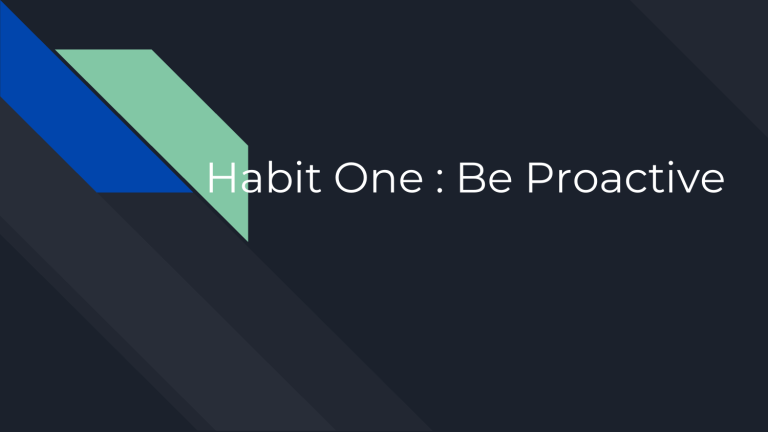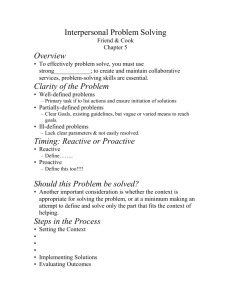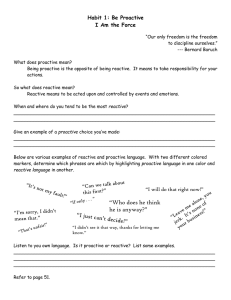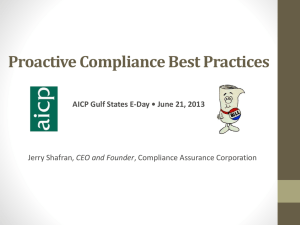
Habit One : Be Proactive Proactive definition •Taking action and making changes before they need to be made, rather than waiting until problems develop An animated video on Habit 1 The first step toward achieving the private victory Until you feel you are in charge of your own life, nothing else is really possible. Proactive or reactive, the choice is yours Each day you have about 100 chances or more to choose whether to be proactive or reactive. Answer these questions …. Have you ever exploded at something or someone? How often have you said I can, I will, I prefer, I believe today? How much do you focus on the things you can change and influence? PROACTIVE vs REACTIVE What happens when you shake a bottle of soda? It EXPLODES!!!!! Proactive -make good choice -calm attitude -do the right things -prepare for anything Reactive -explode at any minute -”catch you off guard” -aren’t ready for anything -deal with things instead of being prepared JUST PUSH PAUSE ● When someone is rude to you, where do you get the power to resist being rude back? JUST PUSH PAUSE An event or thing that creates reaction Our Reaction Proactive vs Reactive - Language What is Proactive Language?? Proactive language shows the speaker taking responsibility for a situation or experience, and seizing control as demonstrated by the use of active and decisive sentences. Proactive language - Example “Let’s look at our alternatives.” “I can choose a different approach.” “I control my own feelings.” “I can create an effective presentation.” “I will choose an appropriate response.” “I choose.” “I prefer.” What is Reactive Language ??? Done in response to a problem or situation. Reacting to problems when they occur instead of doing something to prevent them. Reactive Language - Example “There’s nothing I can do.” “That’s just the way I am.” “He makes me so mad.” “They won’t allow that.” “I have to do that.” “I can’t.” Benefits of Proactive and Reactive Proactive Reactive It improves productivity, efficiency, and the quality of the final product. Managers with a reactive approach show good problem-solving or 'firefighting' skills. Employees feel that their opinion matters, leading to job satisfaction. They defend their team members and their performance against criticism. High level of customer satisfaction. Example Kobe Bryant ● Kobe trained 75 minutes with the trainer at every 4am and then 45 minutes for strength training. ● Kobe: Do you know what it is like at 4am in Los Angeles? In fact, genius is not terrible, the horrible thing is that genius works harder than you! Come on…it’s not that easy, right? ● ● ● ● True, being reactive is so much easier. It’s easy to lose your cool. That doesn’t take any control at all. It’s easy to whine and complain. But…without question, being proactive is the HIGHER ROAD. The key Get in the HABIT of being proactive so you can run on autopilot and not even have to think about it. If you’re choosing to be proactive 20 out of 100 times each day, try doing it 30 out 100 times. Then 40. Never underestimate the huge difference small changes can make. WE CAN CONTROL ONLY ONE THING • • • • The fact is, we can not control everything that happens to us. But we can control HOW WE RESPOND TO WHAT HAPPENS TO US. And that is what counts. Stop worrying about things you can’t control and do things about what you can control. The Circle of No Control or The Circle of Control? CIRCLE OF INFLUENCE / CIRCLE OF CONCERN Things you can’t control • Other people • How others’ react • The weather • Things you did in the past • How other people treat you Things you can control or change • Your attitude • How you react • How you treat others • How active you are • The decisions you make Be smart… Use the four tools you were born with to help you decide what to do. 1. Self- Awareness: Stand apart from yourself & observe your thoughts and actions. 2. Conscience: Listen to your inner voice to know right from wrong. 3. Imagination: Envision new possibilities 4. Willpower: Have the power to choose. Remember…. Your childhood, parents, genes, and your environment influence you to act in certain ways, but they can’t make you do anything. You are free to choose. How to change reactive to proactive ● Dealing with a difficult individual: Try to put yourself in the challenging person’s shoes. To be sure, empathetic statements do not excuse unacceptable behavior. The point is to remind yourself that people do what they do because of their own issues. As long as we’re being reasonable and considerate, difficult behaviors from others say a lot more about them than they do about us. ● Feeling angry and upset with someone: Anger is as harmful as stress. So do not take any decisions when you are angry. You may regret it later. Just try different techniques to cheer up yourself. Get yourself in a state of mind where you can understand the situation better and communicate better ● Feeling fearful or discouraged: As the saying goes - motion dictates emotion. Try intense aerobic exercises. The way we use our body affects greatly how we feel. As you experience the vitality of your body, your confidence will also grow. ● Feeling stressful When you are in stress, there is a high probability of taking wrong decisions. So just take a deep breath and calm down. Try to avoid taking decisions under stress. Instead, wait for a while, elevate your mood by doing your favorite activity and then take decision. Conclusion Being proactive means taking responsibility for your life and actions rather than just watching how things happen. Proactively bring a lot of benefits, this is also obvious and certified to everyone. Being proactive will separate you from a lot of other people! It will give you an advantage in life! You can start today, and make big changes over time. THANK YOU References Danielleisathome Follow. (2009, October 09). Be Proactive 1. Retrieved from https://www.slideshare.net/danielleisathome/be-proactive-1 Macmillan Dictionary. (n.d.). Proactive - definition and synonyms. Retrieved from https://www.macmillandictionary.com/dictionary/british/proactive Maggio, S. (2017, August 07). What Is Proactive Language? Retrieved from https://penandthepad.com/info8490093-proactive-language.html Miller, J. (2017, January 04). Habit #1: Be Proactive. Retrieved from https://www.youtube.com/watch?v=Sg_XuJ0dyP8 SI Blog. (2016, March 11). Reactive Language vs. Proactive Language in the Workplace. Retrieved from http://blog.schedulinginstitute.com/reactive-language-vs-proactive-language-in-theworkplace/#.XA48K2gzZPY TanviShah. (2017, February 03). 7 benefits of being proactive in the workplace. Retrieved from https://jzeroblog.com/2017/02/03/7-benefits-of-being-proactive-in-the-workplace/ Terrell, K. (2015, May 05). Proactive Vs. Reactive Language. Retrieved from https://prezi.com/5itdnblaka4/proactive-vs-reactive-language/ Workspirited. (2018, March 10). Understanding Proactive and Reactive Management Styles With Examples. Retrieved from https://workspirited.com/understanding-proactive-reactive-managementstyles Work it Daily. (n.d.). 10 Ways Employees Can Be More Proactive At Work. Retrieved from https://www.workitdaily.com/be-more-proactive-work/



